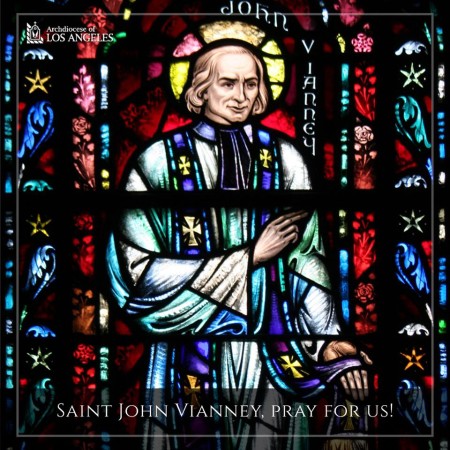 St. John Mary Vianney (1786-1859)
St. John Mary Vianney (1786-1859)
Image Courtesy: Archbishop Jose Gomez
(CNA) Born in France Lyons into a farm family, in John’s youthful days he would teach other children their prayers according to SQPN and Catechism.
Ordained a Priest in 1815, he became Curate Ecully and was subsequently sent to the remote community in France Ars (about 20 miles North of Lyon) in 1818 to become their Parish Priest.
Upon his arrival, Fr. John Vianney immediately began praying and working for the conversion of people in his Parish, although he found himself unworthy of his mission as a Pastor, he allowed himself to be consumed by the love of God as he served others.
Fr. John Vianney slowly helped to revive the community’s faith through both his prayers and the witness of his lifestyle–he would deliver powerful Homilies on the mercy and love of God and it is said ‘that even staunch sinners were converted upon hearing him.’ In addition, Fr. Vianney, restored his Church, formed an La Providence Orphanage (which became a home for the most destitute and school for girls from the surrounding region. Many of the girls once grown went on to have religious lives) and cared for the poor.
Fr. Vianney’s reputation as a Confessor grew rapidly and people traveled from all over France to see him in the Sacrament of Penance and Reconciliation — Firmly committed to the conversion of people, he would sometimes spend up to 16 hrs a day in the Confessional.
Situations calling for ‘impossible’ deeds followed Fr. Vianney everywhere according to Franciscan Media and as a Pastor dedicated to the Blessed Sacrament, he would encounter people who were indifferent and comfortable with their lifestyles which led Fr. Vianney into praying, fasts and short nights of rest in unfailing humility, gentleness, patience and cheerfulness.
Fr. John Vianney passed away on this date at the age of 73 after serving over 40 years as the Parish Priest of Ars — In 1905 he was Beatified by Pope Saint Pius X and was Canonized in 1925 by Pope Pius XI
More here from Pope Benedict XVI